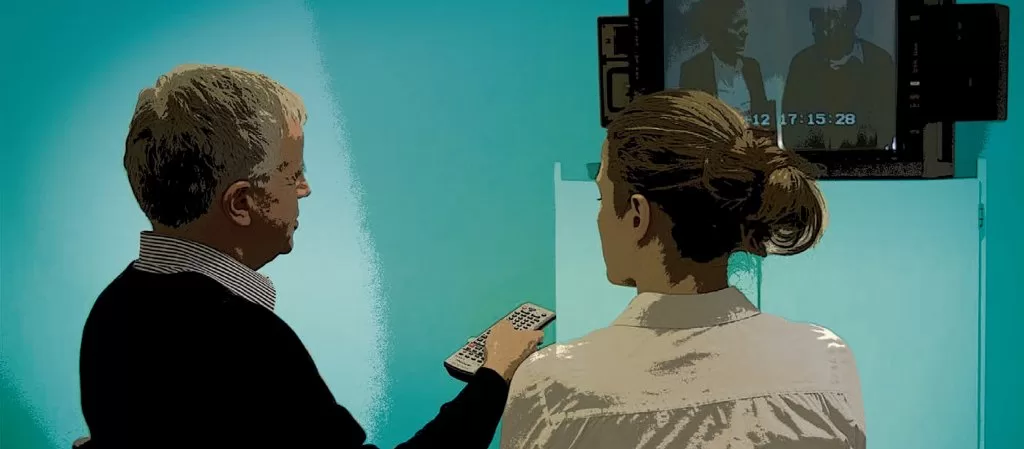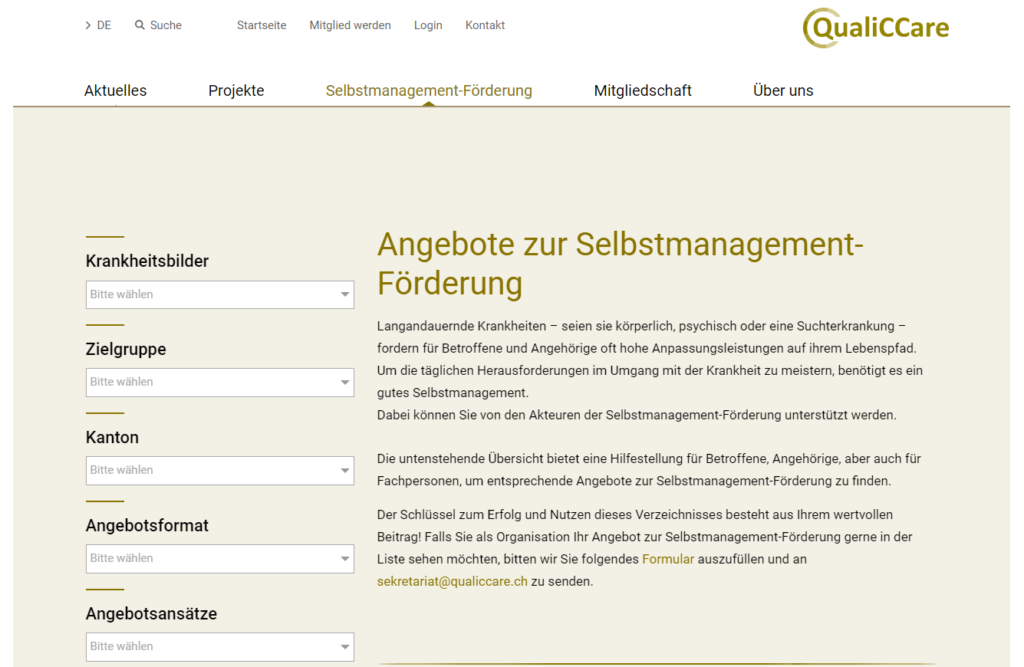Scientific background
Scientific Background
ASSIP (Attempted Suicide Short Intervention Program) is a brief intervention aimed at patients who have attempted suicide. ASSIP was developed in Switzerland by Prof. Dr. Konrad Michel and Dr. phil. Gysin-Maillart.
This brief therapy, consisting of three to four sessions and ongoing written contact over two years, combines elements of action theory, attachment theory, and cognitive behavioral therapy. ASSIP is not a substitute for long-term therapy, but rather a specific clinical intervention aimed at clarifying the background of the suicide attempt and developing measures to prevent further suicidal crises.
For more information, visit www.assip.ch

Publications (Peer reviewed)
Alterations in sample selection and low adherence to psychotherapy manuals lead to unexpected results. A letter to the Editors on “Randomized controlled trial for the Attempted Suicide Short Intervention Program (ASSIP): An independent non-replication study”
Gysin-Maillart, A. C., Walther, S., Lindström, S., Ehnvall, A., Michaud, L., Saillant, S., Berger, G., Adorjan, K., & Schwab, S. (2025)
The Influence of Treatment Latency on Suicide-Specific Treatment Outcomes
Probert-Lindström, S, Bötschi. S., & Gysin-Maillart, A. (2023)
Posttraumatische Belastungsstörung infolge eines Suizidversuchs
Lüke, R., Gerlach, A. L., Gysin-Maillart, A., Lewitzka, U., & Teismann, T. (2023)
ASSIP vs. Crisis Counseling for Preventing Suicide Re-attempts: Outcome Predictor Analysis of a Randomized Clinical Trial Data
Arvilommi, P., Valkonen, J., Lindholm, L., Gaily-Luoma, S., Suominen, K., Gysin-Maillart, A., Ruishalme, O., Isometsä, E. (2022)
Longitudinal Development of Reasons for Living and Dying With Suicide Attempters: A 2-Year Follow-Up Study
Gysin-Maillart, A. C., Jansen, R., Walther, S., Jobes, D. A., Brodbeck, J., & Marmet, S. (2022)
Pilot RCT of the Attempted Suicide Short Intervention Program (ASSIP) adapted for rapid delivery during hospitalization to adult suicide attempt patients with substance use problems
Conner, K. R., Kearns, J. C., Esposito, E. C., Pizzarello, E., Wiegand, T. J., Britton, P. C., Michel, K., Gysin-Maillart, A., & Goldston, D. B. (2021)
Cost-effectiveness of a Brief Structured Intervention Program Aimed at Preventing Repeat Suicide Attempts Among Those Who Previously Attempted Suicide: A Secondary Analysis of the ASSIP Randomized Clinical Trial
Park, A., Gysin-Maillart, A., Müller, T., Exadaktylos, A., Michel, K (2018)
Psychopharmacological treatment is not associated with reduced suicide ideation and reattempts in an observational follow-up study of suicide attempters
Michel, K., Gysin-Maillart, A., Breit, S., Walther, S., & Pavlidou, A. (2021)
Psychotherapie nach einem Suizidversuch – Evidenzlage und Bewertung
Teismann, T., & Gysin-Maillart, A. (2021)
ASSIP: nouvelle modalité thérapeutique après un geste suicidaire
Keller, R., Saillant, S., Gysin-Maillart, A., & Michaud Laurent (2021)
Attempted suicide short intervention program influences coping among patients with a history of attempted suicide
Gysin-Maillart, A., Soravia, L., & Schwab, S. (2020)
Patients’ Satisfaction With the Therapeutic Relationship and Therapeutic Outcome Is Related to Suicidal Ideation in the Attempted Suicide Short Intervention Program (ASSIP)
Ring, M., & Gysin-Maillart, A. (2020)
The Association between Therapeutic Alliance and Individuals’ Wish to Die or Live
Ring, M., Walther, S., & Gysin-Maillart, A. C. (2019)
“I Didn’t Feel Treated as Mental Weirdo”: Primary Findings on Helpful Relationship Characteristics in Suicide Attempt Health Care in Lithuania
Latakienė, J., Mastauskaitė, G., Geležėlytė, O., Mažulytė-Rašytinė, E., Rimkevičienė, J., Skruibis, P., & Gysin-Maillart, A. (2019)
ASSIP – Kurztherapie nach Suizidversuch
Attempted Suicide Short Intervention Program
from Anja Gysin-Maillart
2nd, revised edition, 2021, 120 pages
german
ASSIP – Attempted Suicide Short Intervention Program
A Manual for Clinicians
from Konrad Michel, Anja Gysin-Maillart
2015, x/114 pages
english
Crisis Intervention and Suicidality
Beltz Video Learning
by Tobias Teismann, Anja Gysin-Maillart
- 13 Videos
- 252 minutes
Publications (Peer reviewed)
Reasons for living and dying in suicide attempters: a two-year prospective study
Brüdern, J, Stähli, A., Gysin-Maillart, A., Michel, K., Reisch, Th., Jobes, D. A., & Brodbeck, J. (2018)
A Novel Therapy for People Who Attempt Suicide and Why We Need New Models of Suicide
Michel, K., Valach, L, & Gysin-Maillart, A. (2017)
Suicide Ideation Is Related to Therapeutic Alliance in a Brief Therapy for Attempted Suicide
Gysin-Maillart, A., Soravia, L. M., Gemperli, A., & Michel, K. (2017)
A Novel Brief Therapy for Patients Who Attempt Suicide: A 24-months Follow-Up Randomized Controlled Study of the Attempted Suicide Short Intervention Program (ASSIP)
Gysin-Maillart, A., Schwab, S., Soravia, L. M., Megert, M., & Michel, K. (2016)
The Role of Self-Organization in the Suicidal Process
Brüdern, J., Berger, T., Casper, F., Gysin-Maillart, A., & Michel, K. (2016)
Are Suicide Attempters Wired Differently?: A Comparison With Nonsuicidal Depressed Individuals Using Plan Analysis
Brüdern, J., Berger, T., Michel, K., Gysin-Maillart, A., Schmutz, I., & Caspar, F. (2015)
Gender differences in methods of suicide attempts and prevalence of previous suicide attempts
Kupferschmid, S., Gysin-Maillart, A., Bühler, S.K., Steffen, T., Michel, K., Schimmelmann, B. G., & Reisch, T. (2013)
Ongoing Projects
Overview of All Projects
Project «ASSIP Home Treatment»
Why are we conducting this research project?
- ASSIP Home Treatment (ASSIP HT) is a low-threshold brief therapy designed to support patients after a suicide attempt. The program includes three to four sessions and a 24-month period of written contact. For reasons such as shame, fear of stigmatization, or limited mobility, patients often prefer treatment in their own home environment. ASSIP Home Treatment addresses this need by providing a suicide-specific intervention in the patient’s home. The home-based treatment is offered at four recruitment centers: 1) Sanatorium Kilchberg in Zurich; 2) Psychiatric University Hospital Zurich (PUKZH); 3) Centre Hospitalier Universitaire Vaudois (CHUV); 4) Center Neuchâtelois de Psychiatrie (CNP). The project examines the effects of ASSIP HT on suicidal thoughts and behaviors, as well as the feasibility and cost-effectiveness of the intervention. ASSIP Home Treatment is funded by Health Promotion Switzerland.
Objectives of the ASSIP Home Treatment Project
- Awareness: Within the framework of training formats (e.g., quality circles, reports, conferences, etc.), the participating organizations should become familiar with ASSIP HT. They will be trained in the assessment of and response to suicidal experiences and behaviors.
- Implementation: ASSIP Home Treatment is intended to be established as a mobile service within institutions and clinics. Existing personnel and institutional resources will be utilized, and interprofessional collaboration will be strengthened. This aims to bridge the gap between outpatient and inpatient care.
- Networking: Close collaboration with emergency departments, primary care professionals, outpatient nursing services, and psychiatric institutions is intended to better reach patients. ASSIP HT is aimed at vulnerable, immobile individuals and their relatives.
- Delivery: The intervention is provided by trained psychotherapists in the patients’ home environment. The focus is on recognizing warning signs and developing alternative strategies for suicidal crises. This promotes patient autonomy and self-management, leading to an improved quality of life.
Project «NePsy ASSIP HT»
(Neuro-)psychological Research (Project 1)
Why are we conducting this research project?
- Project Goal: Our aim is to investigate how (neuro-)psychological patterns differ between suicidal and non-suicidal individuals. To this end, patients currently receiving treatment at the University Clinic for Psychiatry and Psychotherapy Bern (UPD) will be invited to participate. To ensure comparability between groups, a non-clinical control group will also be recruited.
- In this research project, we aim to investigate (neuro-)psychological domains that may play a central role in the suicide process.
- This sub-study is part of the main study ‘NePsy ASSIP HT’ and serves as the basis for two additional studies.
General Information
- Previous studies have shown that measuring unconscious cognitive associations can help distinguish between individuals with and without suicidal thoughts and behaviors. Based on these previous findings, the present study examines individuals from different backgrounds:
1) Individuals with a history of suicide attempts
2) Individuals experiencing suicidal thoughts but with no history of suicide attempts
3) Individuals from a clinical group without suicidal thoughts or behaviors
4) Individuals from a healthy control group - A total of 291 study participants will be examined. This study is conducted in accordance with Swiss law and also adheres to all internationally recognized guidelines. The responsible ethics committee has reviewed and approved the study.
- Would you like to receive more information about the research project? We look forward to hearing from you via email at lara.aschenbrenner@unibe.ch
(Neuro-)psychological Research (Project 2)
Why are we conducting this research project?
- In Switzerland, approximately 1,000 people die by suicide each year, and it is estimated that around 33,000 individuals attempt suicide annually. A suicide attempt is a major risk factor for completed suicide. Therefore, effective treatment for individuals after a suicide attempt, which reduces the risk of a repeat attempt or completed suicide, is essential.
- In Research Project 2, we aim to investigate the mechanisms of action of the brief therapy ASSIP. This knowledge can be used nationally and internationally to improve clinical work with individuals after a suicide attempt and contribute to the prevention of fatal suicides.
General Information
- Objective: The aim of Research Project 2 is to determine the impact of the brief therapy ASSIP on psychological and neuropsychological patterns in individuals after a suicide attempt, and to identify which therapeutic mechanisms are relevant.
- Procedure: For this study, patients with a history of suicide attempts who are currently receiving treatment at the University Clinic for Psychiatry and Psychotherapy Bern (UPD) will be invited to participate. Participants will be randomly assigned to two different groups. One group will receive three to four sessions of the suicide-specific intervention ASSIP in addition to their regular treatment. The other group will receive three to four sessions based on the standard treatment in Switzerland for individuals after a suicide attempt, also in addition to their regular treatment. For scientific purposes, participants will also attend three additional appointments, during which they will be asked to complete questionnaires, undergo neuropsychological testing, and participate in a clinical interview. Furthermore, participants will be asked to complete questionnaires on their personal smartphones between treatment sessions.
- This research project complies with Swiss law and also adheres to all internationally recognized guidelines. The responsible ethics committee has reviewed and approved the study.
- Are you interested in participating or would you like to receive more information about the research project? We look forward to hearing from you via email at marie-anna.sedlinska@unibe.ch
(Neuro-)psychological Research (Project 3)
Warum führen wir dieses Forschungsprojekt durch?
- Ziel des Projekts: die Auswirkungen von ASSIP HT werden auf Suizidgedanken und -verhalten sowie die Durchführbarkeit und Kosteneffektivität während eines 24-monatigen Nachbeobachtungszeitraums untersucht.
Allgemeine Informationen
- Die Kurztherapie ASSIP reduziert das Risiko für weitere suizidale Handlungen um annähernd 80% . Obwohl kurze und wirksame Interventionen für Menschen nach einem Suizidversuch existieren, gibt es unseres Wissens nur wenige suizidspezifische, häusliche Behandlungsdienste für Menschen nach einem Suizidversuch.
- Das Angebot besteht aus drei bis vier Sitzungen. In der ersten Sitzung erzählen die Patienten in ihren eigenen Worten die Geschichte ihres Suizidversuchs. Diese Sitzung wird videographiert. In der zweiten Sitzung wird die Aufnahme gemeinsam mit dem/der Therapeuten:in angeschaut. Ziel ist es, Hintergründe suizidaler Krisen besser zu verstehen und gemeinsam individuelle Strategien zur Vorbeugung weiterer Krisen zu erarbeiten. In der dritten Sitzung werden Hintergründe, längerfristige Therapieziele sowie Warnzeichen und Strategien gemeinsam erarbeitet. Diese werden in einem persönlichen Krisenplan (Leporello) schriftlich festgehalten. Im Anschluss an die Kurztherapie erhalten die Patienten über zwei Jahre hinweg Briefe von ihrem:r Therpeuten:in.
- Patient:innenn aus den Kantonen Bern, Zürich, Waadt und Neuenburg werden für die Evaluation von ASSIP HT berücksichtigt.
- Die zuständige Ethikkommission hat die Evaluation geprüft und bewilligt. Eine Beschreibung der Evaluation finden Sie auch auf der Internetseite ClinicalTrials.gov, ein Register für klinische Studien.
Partnerprojekte

Projekt «Verbreitung der ASSIP-Methode in der Westschweiz»
ASSIP ist eine Therapiemethode für Personen nach einem Suizidversuch, die bereits in der Deutschschweiz und im Ausland praktiziert wird. Das Projekt soll die Methode nun auch in der Westschweiz etablieren.

Projekt «AdoASSIP – Prävention von Suizidversuchen und Suiziden bei Adoleszenten»
AdoASSIP ist eine Kurzintervention zur Suizidprävention nach Suizidversuchen bei Jugendlichen. In Ergänzung zur bestehenden Therapie nehmen Jugendliche nach Suizidversuchen und deren Familien an einem Kurzprogramm zur Rückfallprävention von Suizidversuchen sowie zur Suizidprävention teil.
Weiter soll AdoASSIP die Vernetzung ambulanter und stationärer Akteur:innen fördern und so einen proaktiven und integrativen Umgang mit Adoleszenten mit suizidalen Verhaltensweisen sichern, insbesondere nach stationären und akutpsychiatrischen Kriseninterventionen (z.B. auf Notfallstationen).

Projekt «SERO – Suizidprävention: Einheitlich Regional Organisiert»
Mit dem Ziel, Suizide und Suizidversuche zu reduzieren hat die Luzerner Psychiatrie gemeinsam mit der Gesundheitsförderung Schweiz und weiteren Trägerorganisationen das Projekt SERO (Suizidprävention Einheitlich Regional Organisiert) ins Leben gerufen. SERO richtet sich einerseits an Betroffene und Angehörige, um das Selbstmanagement zu fördern. Andererseits werden Fachleute unterstützt, eine zuverlässige klinische Einschätzung des Suizidrisikos vorzunehmen, um im Notfall entsprechende Hilfestellungen für Betroffene bieten zu können.
bag-blueprint.ch: Gesundheitsprojekte finden und teilen
Die Website umfasst rund 200 Projekte aus den Bereichen betreuende Angehörige, Demenz, Interprofessionalität, Palliative Care und Suizidprävention.
Das Bundesamt für Gesundheit BAG veröffentlicht Gesundheitsprojekte zu diesen Fachbereichen aus der Schweiz. Fachpersonen, Multiplikatoren und Interessierte aus Gesundheit, Sozialem, Bildung und Verwaltung finden hier Inspiration und Ideen zum Nachmachen. Weitere Praxisbeispiele werden laufend ergänzt.
Qualiccare: Angebote zur Selbstmanagement-Förderung finden und teilen

Die Übersicht bietet eine Hilfestellung für Betroffene, Angehörige, aber auch für Fachpersonen, um entsprechende Angebote zur Selbstmanagement-Förderung zu finden.
Das Verzeichnis besteht aus eingegebenen Beiträgen. Dabei kann man folgendes Formular auszufüllen und es an sekretariat@qualiccare.ch zusenden.
Mitteilungen
Une thérapie à domicile après un acte suicidaire
REISO – Revue d’information sociale (nur auf französisch)
Beitrag vom November 2023
Newsletter VBP Verband
Berner Psycholog:innen
Beitrag vom Juli 2023
HIN
ASSIP Home Treatment: Unterstützung und niederschwellige Therapie
nach einem Suizidversuch
Beitrag vom August 2021
im doc.be (Das Magazin der Aerztegesellschaft des Kantons Bern)
Beitrag vom Juni 2021
Projekt SERO – Suizidprävention Einheitlich Regional Organisiert
Video Attempted Suicide Short Intervention Program (ASSIP)
von Office of Mental Health (2020)
ASSIP: nouvelle intervention disponible après tentative de suicide
CHUV (nur auf französisch)
Kurztherapie für Patientinnen und Patienten nach einem Suizidversuch
Universitätsspital Zürich
Kurztherapie für Patientinnen und Patienten nach einem Suizidversuch – USZ
Revue médicale suisse (nur auf französisch)
Qualitätsverbesserungs-massnahme
Suizidprävention nach Suizidversuch mittels
Attempted Suicide Short Intervention Program
(ASSIP)
Videobeiträge
Zahlen und Fakten zur Suizidalität in der Schweiz
Behandlungs- und Therapiemethoden, um Menschen nach einem Suizidversuch professionell zu unterstützen
Die Therapiemethode ASSIP: Attempted Suicide Short Intervention Program
Archiv Veranstaltungen
PowerPoint-Folien vom Suizidpräventions-Symposium für den Download
Universitäre Psychiatrische Dienste Bern (UPD) | Neue Erkenntnisse in der Suizidprävention
Suizidprävention in der Projektförderung PGV
Dr. Franziska Widmer Howald, Gesundheitsförderung Schweiz
ASSIP und ASSIP Home Treatment
Dr. phil. Anja Gysin-Maillart und Prof. Dr. med. Sebastian Walther, UPD
500 trials in 40 years: what do they tell us about the effects of antidepressants
Prof. Dr. Georgia Salanti, Universität Bern